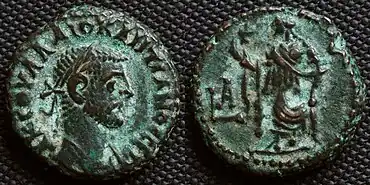 | |
| O: laureate draped bust of Diocletianus | R: Elpis holding flower and raising skirt
L A (coin is from 1st year of reign) |
| bronze tetradrachm struck in Alexandria 284-285 AD; ref.: Milne 4750 | |
In Greek mythology, Elpis (Ancient Greek: ἐλπίς) is the spirit of hope. She was depicted as a young woman, usually carrying flowers or a cornucopia in her hands.
Family
Elpis is perhaps a mother of Pheme, the goddess of fame, renown and rumor.
Mythology
In Hesiod's Works and Days, Elpis was the last item in Pandora's box (or jar). Based on Hesiod's description, the debate is still alive to determine if Elpis was only hope, or more generally expectation. Her equivalent in Roman mythology was Spes.
Hesiod's Works and Days
The more famous version of the Pandora myth comes from one of Hesiod's poems, Works and Days. In this version of the myth (lines 60–105), Hesiod expands upon her origin, and moreover widens the scope of the misery she inflicts on mankind. Pandora brings with her a jar[lower-alpha 1][lower-alpha 2] containing[lower-alpha 3] "burdensome toil and sickness that brings death to men" (91–92), diseases (102) and "a myriad other pains" (100). Prometheus had – fearing further reprisals – warned his brother Epimetheus not to accept any gifts from Zeus. But Epimetheus did not listen; he accepted Pandora, who promptly scattered the contents of her jar. As a result, Hesiod tells us, "the earth and sea are full of evils" (101). One item, however, did not escape the jar (96–99), hope:
Only Hope was left within her unbreakable house,
she remained under the lip of the jar, and did not
fly away. Before [she could], Pandora replaced the
lid of the jar. This was the will of aegis-bearing
Zeus the Cloudgatherer.
Hesiod does not say why hope (elpis) remained in the jar.[lower-alpha 4] The implications of Elpis remaining in the jar were the subject of intense debate even in antiquity.
Hesiod closes with this moral (105): "Thus it is not possible to escape the mind of Zeus."
Namesakes
- Elpis was the name of a concubine of Herod the Great; her origins and fate are unknown.
References
Notes
- ↑ A pithos is a very large jar, usually made of rough-grained terracotta, used for storage.
- ↑ Cf. Verdenius, p. 64, comment on line 94, on pithos. "Yet Pandora is unlikely to have brought along the jar of ills from heaven, for Hes. would not have omitted describing such an important detail. According to Proclus, Prometheus had received the jar of ills from the satyrs and deposited it with Epimetheus, urging him not to accept Pandora. Maz. [Paul Mazon in his Hesiode] suggests that Prometheus probably had persuaded the satyrs to steal the jar from Zeus, when the latter was about to pour them out over mankind. This may have been a familiar tale which Hes. thought unnecessary to relate."
- ↑ Contra M. L. West, Works and Days, p. 168. "Hesiod omits to say where the jar came from, and what Pandora had in mind when she opened it, and what exactly it contained". West goes on to say this contributes to the "inconclusive Pandora legend".
- ↑ Regarding line 96. Verdenius says that Hesiod "does not tell us why elpis remained in the jar. There is a vast number of modern explanations, of which I shall discuss only the most important ones. They may be divided into two classes according as they presume that the jar served (1) to keep elpis for man, or (2) to keep off elpis from man. In the first case the jar is used as a pantry, in the second case it is used as a prison (just as in Hom. E 387). Furthermore, elpis may be regarded either (a) as a good, or (b) as an evil. In the last case it is to comfort man in his misery and a stimulus rousing his activity, in the second case it is the idle hope in which the lazy man indulges when he should be working honestly for his living (cf. 498). The combination of these alternatives results in four possibilities which we shall now briefly consider."[1]
Citations
- ↑ Verdenius 1985, p. 66
Bibliography
- Verdenius, Willem Jacob (1985), A Commentary on Hesiod Works and Days vv 1–382, E. J. Brill, ISBN 90-04-07465-1
Further reading
- West, M. L. Hesiod, Theogony, ed. with prolegomena and commentary (Oxford 1966).
- West, M. L. Hesiod, Works and Days, ed. with prolegomena and commentary (Oxford 1978).